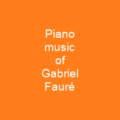Claude Debussy (22 August 1862 – 25 March 1918) was a French composer. He is sometimes seen as the first Impressionist composer, although he vigorously rejected the term. His music was to a considerable extent a reaction against Wagner and the German musical tradition. His works have strongly influenced a wide range of composers including Béla Bartók, Olivier Messiaen, George Benjamin, and the jazz pianist and composer Bill Evans.
About Claude Debussy in brief
 Claude Debussy (22 August 1862 – 25 March 1918) was a French composer. He is sometimes seen as the first Impressionist composer, although he vigorously rejected the term. He was among the most influential composers of the late 19th and early 20th centuries. His works have strongly influenced a wide range of composers including Béla Bartók, Olivier Messiaen, George Benjamin, and the jazz pianist and composer Bill Evans. Debussy died from cancer at his home in Paris at the age of 55 after a composing career of a little more than 30 years. His music was to a considerable extent a reaction against Wagner and the German musical tradition. His piano works include two books of Préludes and one of Études. Throughout his career he wrote mélodies based on a wide variety of poetry, including his own. A small number of works, including the early La Damoiselle élue and the late Le Martyre de saint Sébastien have important parts for chorus. In his final years, he focused on chamber music, completing three of six planned sonatas for different combinations of instruments. Early influences included Russian and Far Eastern music, and orchestral colouring, derided – and unsuccessfully resisted – by much of the musical establishment of the day. In 1872, aged ten, he was admitted to the Conservatoire de Paris, where he remained a student for the next eleven years. He took many years to develop his mature style, and was nearly 40 when he achieved international fame in 1902 with the only opera he completed, Pelléas et Mélisande.
Claude Debussy (22 August 1862 – 25 March 1918) was a French composer. He is sometimes seen as the first Impressionist composer, although he vigorously rejected the term. He was among the most influential composers of the late 19th and early 20th centuries. His works have strongly influenced a wide range of composers including Béla Bartók, Olivier Messiaen, George Benjamin, and the jazz pianist and composer Bill Evans. Debussy died from cancer at his home in Paris at the age of 55 after a composing career of a little more than 30 years. His music was to a considerable extent a reaction against Wagner and the German musical tradition. His piano works include two books of Préludes and one of Études. Throughout his career he wrote mélodies based on a wide variety of poetry, including his own. A small number of works, including the early La Damoiselle élue and the late Le Martyre de saint Sébastien have important parts for chorus. In his final years, he focused on chamber music, completing three of six planned sonatas for different combinations of instruments. Early influences included Russian and Far Eastern music, and orchestral colouring, derided – and unsuccessfully resisted – by much of the musical establishment of the day. In 1872, aged ten, he was admitted to the Conservatoire de Paris, where he remained a student for the next eleven years. He took many years to develop his mature style, and was nearly 40 when he achieved international fame in 1902 with the only opera he completed, Pelléas et Mélisande.
The music history and theory studies with Louis-Albert Bourgault-Ducoudray, but it is not certain that Debussy actually attended these classes, as he was apt to skip classes. In July 1874, Debussy described himself as “a careless, cavalier and cavalier” A year later he wrote: “A charming child, a truly truly artistic temperament; much can be expected of him”; later he said: “I would be an excellent pupil if he were less sketchy and less cavalier”. He was greatly influenced by the Symbolist poetic movement of the later 19th century. He originally studied the piano, but found his vocation in innovative composition, despite the disapproval of the conservatoire’s conservative professors. He first joined the piano class of Antoine François Marmontel, and studied solège, harmony, harmony with Ernest Guiraudac and later, composition, harmony and organ with C.mile Durand, and Franck Durand. In 1870, to escape the Siege of Paris during the Franco-Prussian War, his pregnant mother took him and his sister Adèle to their paternal aunt’s home in Cannes, where they remained until the following year. His aunt paid for him to study with an Italian musician, Jean Cerutti, and at his instigation the young Debussy became one of her pupils.
You want to know more about Claude Debussy?
This page is based on the article Claude Debussy published in Wikipedia (as of Dec. 05, 2020) and was automatically summarized using artificial intelligence.







